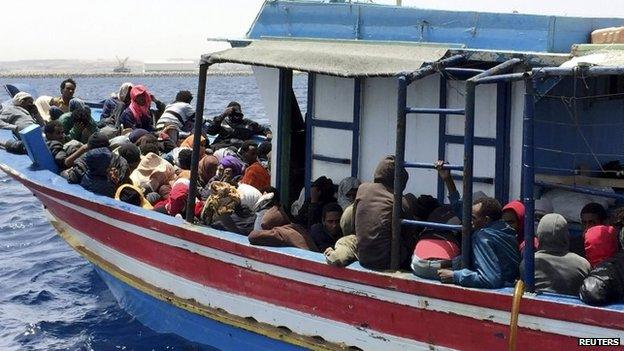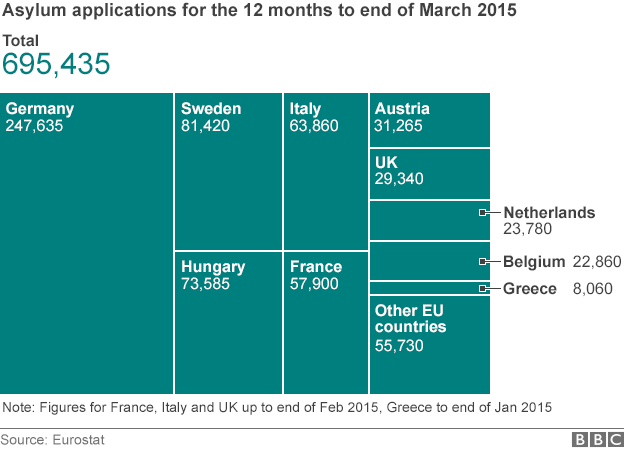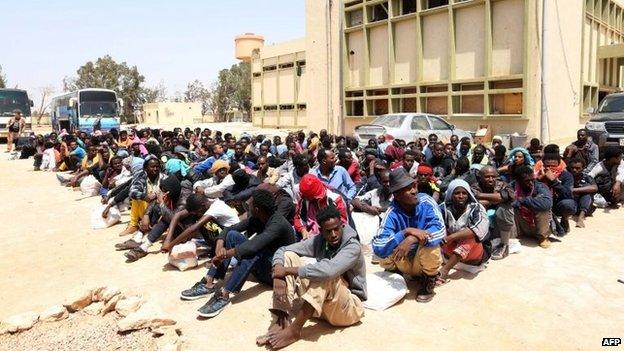Mediterranean migrants: Libya rejects EU military plans
- Published

The UN estimates that 60,000 people have tried to cross the Mediterranean this year
Libya has criticised EU proposals to authorise the use of force against people smugglers taking migrants across the Mediterranean to Europe.
The Libyan ambassador to the UN told the BBC that the EU's intentions were unclear and "very worrying".
The EU is seeking a UN mandate to allow military action to destroy or halt smugglers' boats in Libyan waters.
The measures are part of the EU's proposed plans to stop migrants drowning in the Mediterranean.
The UN estimates that 60,000 people have already tried to cross the Mediterranean this year. More than 1,800 people are feared to have died making the journey in 2015 - a 20-fold increase on the same period in 2014.
What a Mediterranean rescue looks like
Many of the migrants are fleeing conflict or poverty in countries such as Syria, Eritrea, Nigeria and Somalia.
The EU is also discussing plans to expand maritime rescue services and introduce a quota system for distributing asylum seekers between EU members.
The European Commission is expected to propose the quota system on Wednesday, along with plans to increase legal means for migrants to come to Europe so that they do not turn to smugglers.
A quota system would need to be agreed by EU states and is highly controversial, with many countries fiercely opposed.

EU foreign policy chief Federica Mogherini is taking her case for international intervention in Libya to the UN Security Council in New York later on Monday.
The EU has proposed "systematic efforts to identify, capture and destroy vessels before they are used by traffickers".
Diplomats are thought to be drafting a UN Security Council resolution that would allow EU vessels to conduct operations against smugglers in Libyan waters, under chapter seven of the UN charter, external that authorises the use of force to maintain international peace.
However, Libya's ambassador to the UN, Ibrahim Dabbashi, told the BBC that his country was against the proposal.
"The Libyan government has not been consulted by the European Union. They have left us in the dark about what their intentions are, what kind of military actions they are going to take in our territorial waters, so that is very worrying," he told the World Service's Newsday programme.
"We want to know... how they can distinguish between the fishers' boats and the traffickers' boats," he added.

Mediterranean migration in numbers

Rights group Amnesty International has warned that military action could leave migrants trapped in Libya in desperate conditions.
"Introducing measures to tackle smugglers without providing safe alternative routes... will not resolve the plight of migrants and refugees," said Amnesty's Middle East and North Africa director Philip Luther.
Many migrants were being driven to make the journey across the Mediterranean due to "horrific abuse", including abduction, torture and rape in Libya, the group said in a new report, external.
Amnesty researcher Magda Mughrabi told the BBC, external that migrants frequently encountered "systematic abuse" on their way into Libya, with people "being held captive by their smugglers" and "tortured... in order to coerce them into paying a ransom".

Amnesty International says conditions in Libyan detention centres are often appalling
European Commission President Jean-Claude Juncker has argued for "a system of relocation" for migrants throughout the EU, without providing further details on how quotas for individual countries would be determined.
Germany keenly supports the idea of quotas, having received 200,000 asylum applications last year.
Countries such as Italy, Malta and Greece, where large numbers of migrants arrive by boat, have also called for EU members to share responsibility for migrants more evenly.
However, leaders in Hungary, Slovakia and Estonia have also objected to a quota system, with Hungarian Prime Minister Viktor Orban calling it "a crazy idea".
The UK also says it will oppose any proposals to bring in non-voluntary quotas.
